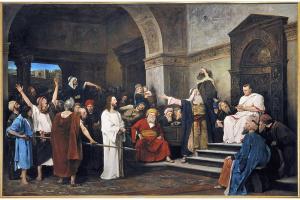
My proposal in this series on the Jesus of history and the character of God is something N.T. Wright put eloquently, namely,
not that we understand what the word “god” means and manage somehow to fit Jesus into that. Instead, I suggest that we think historically about a young Jew, possessed of a desperately risky, indeed apparently crazy, vocation, riding into Jerusalem in tears, denouncing the Temple, and dying on a Roman cross—and that we somehow allow our meaning for the word “god” to be recentered around that point.
Christian must study history. This post is a reflection on how odd that is.
Second in a series of posts that I call “Stories of Jesus and the Character of God.” In this series I probe what historical Jesus scholars can say about the humanness and the earthly career of Jesus—beyond which historical research cannot go. The ultimate objective is to let this Jesus reveal the character of God. Contents and links to other entries in the series here.
A strange step into history
The study of history is of no practical use whatsoever.
I forget the name and place of the museum where a guide, who actually knew a lot of history, said that. That view of history would have suited me fine in high school. All those names and dates with no logic to them! I preferred things that made sense like physics, math, and grammar. But I’m also a Christian, and Christians have to take history seriously. If that museum guide is right, if all we need to know is what lies in front of us in the present, then Christianity is wrong.
Here’s another quote:
God has revealed himself as history, not as a compendium of abstract truths. – Pope Francis, interview with La Civilta Cattolica, August 2013
We’re happy with abstract truths – ideas taken out of the history or our own experience of the world. In math we have theorems, and there doesn’t have to be any real Pythagoras or any real triangle for the Pythagorean Theorem to be true. In science, if the Theory of Relativity is true, it doesn’t matter who Albert Einstein is. We have economic theories like Neo-liberalism and Communism, and they work the same whether Karl Marx liked the one or the other. There would be moral virtues even if Socrates was a schmuck or a character Plato dreamed up. Even in religions we find compendiums of abstract truths. Buddhism’s Eight-fold Path would be just as enlightening if the Buddha never existed. And the Golden Rule doesn’t need Jesus or Confucius to be a good idea. Why not go with abstract truths and forget their history or how we got them?
But Christianity cant’ exist with just the ideas but not the remembrance of Jesus. A Judaism that preserves all the wisdom but forgets the history of the Jewish people is impossible. Biblical faith is uniquely historical. It isn’t just a case of some people getting a revelation about God and passing that knowledge on. It’s meeting God in history and being changed in the encounter. You don’t just get an idea, a new possession; you become a new person. Then you go back with a new openness, and grow some more. Encountering a person is like that. Christians don’t settle for ideas taken out of history. They want an ongoing relationship with God.
A creed that’s really a story, not an essay
History is an important factor in the Nicene Creed, a statement of Christian doctrine from the Council of Nicea in 325. The words in the Creed that historians can make some confident judgments about are in bold print:
I believe in one Lord Jesus Christ, the Only Begotten Son of God, born of the Father before all ages. God from God, Light from Light, true God from true God, begotten, not made, consubstantial with the Father; through whom all things were made. For us men [the Greek and Latin say human beings] and for our salvation he came down from heaven, and by the Holy Spirit was incarnate of the Virgin Mary, and became man. For our sake he was crucified under Pontius Pilate, he suffered death and was buried…. (Translation from the Roman Catholic liturgy)
Jesus is a verifiable person in history. With “incarnate” the Creed supposes a pre-existence that historians can’t handle, but there is the reliable fact of Jesus’ birth and parentage. Jesus’ burial is probable though historians say victims of crucifixion were often left to be eaten by wild animals. But the crucifixion is about as certain as an ancient historical event can be. So is some role by the Roman procurator Pontius Pilate. He is the Creed’s connection to the wider secular world. This history is central to the Christian faith.
That is strange because historical events are just things that happened that could as easily have happened differently or not at all. Samuel Clemens says history is “one damn thing after another.” Yet the Jews found their history to be a meaningful story. Christians, originally a sect within Judaism, discover the meaning of that story in a single Jew from a tiny corner of the world a long time ago.
Finding Jesus in history
The word “story” is key. If existence in this world is a story, then past and future are as important as the present. As in any good story, there may just be a moment that holds the key to it all. Miss that moment and you miss the story. For Christians Jesus occupies that central point.
Since history is so important in Christianity, it seems Christians would really want to seek and find out exactly what Jesus’ history is. Surprisingly, that search didn’t really get going until about the 18th or 19th century. Around then began what is known as the quest of the historical Jesus. Historians aimed to zero in on the goal of knowing history as it actually was, rather than as legend and creed would have it.
Where Jesus is concerned, that goal was a way off. The next post will explore the ups and downs of the quest of the historical Jesus.
Image credit: History News Network, via Google Images












